Abarth 500 595 695 vs VW Transporter Bus – Which model is better for everyday use?
Compare performance, boot capacity, efficiency and price at a glance.
Find out which car is the better choice for you – Abarth 500 595 695 or VW Transporter Bus?
Costs and Efficiency:
Looking at overall running costs, both models reveal some interesting differences in everyday economy.
Abarth 500 595 695 has a clearly perceptible advantage in terms of price – it starts at 32600 £, while the VW Transporter Bus costs 41500 £. That’s a price difference of around 8916 £.
In terms of energy consumption, the advantage goes to the Abarth 500 595 695: with 17.10 kWh per 100 km, it’s noticeable more efficient than the VW Transporter Bus with 22.40 kWh. That’s a difference of about 5.30 kWh.
As for range, the VW Transporter Bus performs somewhat better – achieving up to 324 km, about 59 km more than the Abarth 500 595 695.
Engine and Performance:
Under the bonnet, it becomes clear which model is tuned for sportiness and which one takes the lead when you hit the accelerator.
When it comes to engine power, the VW Transporter Bus has a clearly edge – offering 286 HP compared to 155 HP. That’s roughly 131 HP more horsepower.
In acceleration from 0 to 100 km/h, the Abarth 500 595 695 is hardly perceptible quicker – completing the sprint in 7 s, while the VW Transporter Bus takes 7.40 s. That’s about 0.40 s faster.
In terms of top speed, the VW Transporter Bus performs clearly perceptible better – reaching 200 km/h, while the Abarth 500 595 695 tops out at 155 km/h. The difference is around 45 km/h.
There’s also a difference in torque: VW Transporter Bus pulls clearly stronger with 415 Nm compared to 235 Nm. That’s about 180 Nm difference.
Space and Everyday Use:
Whether family car or daily driver – which one offers more room, flexibility and comfort?
Seats: VW Transporter Bus offers convincingly more seating capacity – 8 vs 4.
In curb weight, Abarth 500 595 695 is convincingly lighter – 1410 kg compared to 1998 kg. The difference is around 588 kg.
In terms of boot space, the VW Transporter Bus offers significantly more room – 763 L compared to 185 L. That’s a difference of about 578 L.
In maximum load capacity, the VW Transporter Bus performs significantly better – up to 4005 L, which is about 3455 L more than the Abarth 500 595 695.
When it comes to payload, VW Transporter Bus clearly takes the win – 1143 kg compared to 385 kg. That’s a difference of about 758 kg.
Who comes out on top?
Overall, the VW Transporter Bus shows itself to be leaves the rival little chance and secures the title of DriveDuel Champion.
It convinces with the more balanced overall package and proves to be the more versatile choice for everyday use.

VW Transporter Bus
Abarth 500 595 695
The Abarth 500, particularly in its 595 and 695 renditions, captures the spirit of Italian motoring with its compact yet aggressive design. Known for its lively performance and distinctive styling, this little powerhouse is a joy to drive, offering an engaging experience that appeals to enthusiasts. With its rich motorsport heritage, the Abarth 500 embodies the essence of fun and excitement on both the streets and the race track.
details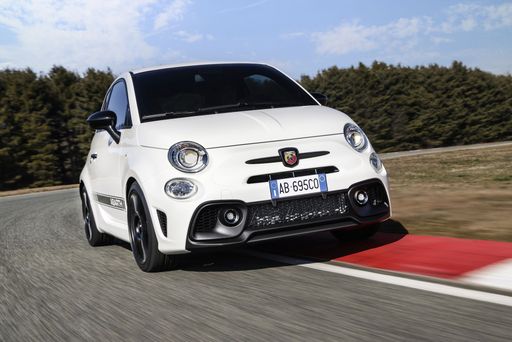 @ Abarth / Stellantis Media
@ Abarth / Stellantis Media
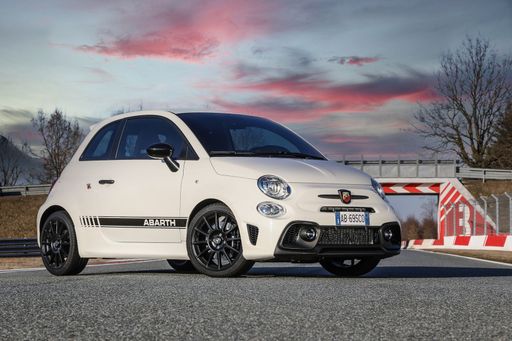 @ Abarth / Stellantis Media
@ Abarth / Stellantis Media
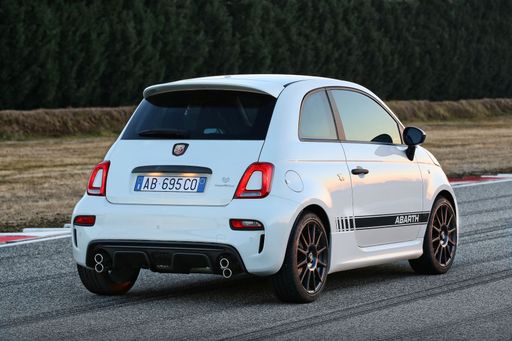 @ Abarth / Stellantis Media
@ Abarth / Stellantis Media
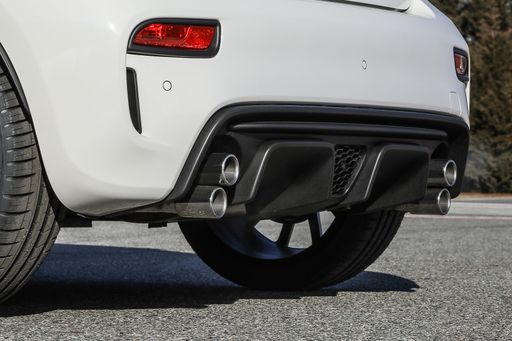 @ Abarth / Stellantis Media
@ Abarth / Stellantis Media
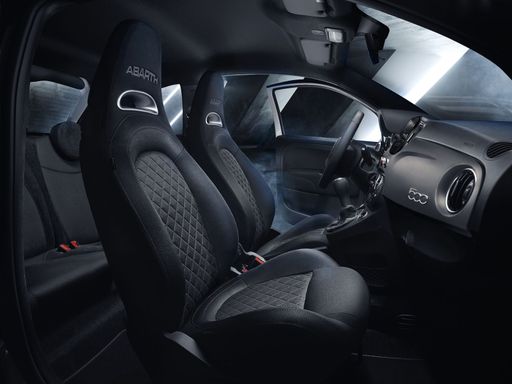 @ Abarth / Stellantis Media
@ Abarth / Stellantis Media
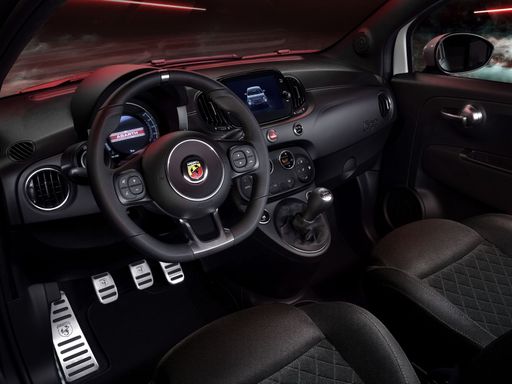 @ Abarth / Stellantis Media
@ Abarth / Stellantis Media
VW Transporter Bus
The VW Transporter Bus from Volkswagen Commercial Vehicles is a versatile and reliable choice for both business and leisure purposes. It offers ample space and a flexible interior, making it ideal for transporting passengers or goods comfortably. The vehicle combines practicality with modern styling, ensuring it meets the demands of everyday use while maintaining an eye-catching appearance.
details
 @ Abarth / Stellantis Media
@ Abarth / Stellantis Media
|
|
|
|
|
Costs and Consumption |
|
|---|---|
|
Price
32600 - 39400 £
|
Price
41500 - 85100 £
|
|
Consumption L/100km
-
|
Consumption L/100km
0.8 - 9.2 L
|
|
Consumption kWh/100km
17.1 - 18.8 kWh
|
Consumption kWh/100km
22.4 - 24.9 kWh
|
|
Electric Range
242 - 265 km
|
Electric Range
87 - 324 km
|
|
Battery Capacity
37.80 kWh
|
Battery Capacity
11.8 - 63.8 kWh
|
|
co2
0 g/km
|
co2
0 - 229 g/km
|
|
Fuel tank capacity
-
|
Fuel tank capacity
45 - 60 L
|
Dimensions and Body |
|
|---|---|
|
Body Type
Hatchback
|
Body Type
Bus
|
|
Seats
4
|
Seats
4 - 8
|
|
Doors
3
|
Doors
4 - 5
|
|
Curb weight
1410 - 1435 kg
|
Curb weight
1998 - 2620 kg
|
|
Trunk capacity
185 L
|
Trunk capacity
0 - 763 L
|
|
Length
3673 mm
|
Length
4973 - 5450 mm
|
|
Width
1682 mm
|
Width
1941 - 2032 mm
|
|
Height
1518 mm
|
Height
1907 - 1997 mm
|
|
Max trunk capacity
550 L
|
Max trunk capacity
3672 - 4005 L
|
|
Payload
370 - 385 kg
|
Payload
330 - 1143 kg
|
Engine and Performance |
|
|---|---|
|
Engine Type
Electric
|
Engine Type
Diesel, Petrol, Plugin Hybrid, Electric
|
|
Transmission
Automatic
|
Transmission
Manuel, Automatic
|
|
Transmission Detail
-
|
Transmission Detail
Manual Gearbox, Automatic Gearbox, Dual-Clutch Automatic
|
|
Drive Type
Front-Wheel Drive
|
Drive Type
Front-Wheel Drive, All-Wheel Drive, Rear-Wheel Drive
|
|
Power HP
155 HP
|
Power HP
110 - 286 HP
|
|
Acceleration 0-100km/h
7 s
|
Acceleration 0-100km/h
7.4 - 16.9 s
|
|
Max Speed
155 km/h
|
Max Speed
112 - 200 km/h
|
|
Torque
235 Nm
|
Torque
310 - 415 Nm
|
|
Number of Cylinders
-
|
Number of Cylinders
4
|
|
Power kW
114 kW
|
Power kW
81 - 210 kW
|
|
Engine capacity
-
|
Engine capacity
1498 - 2488 cm3
|
General |
|
|---|---|
|
Model Year
2023
|
Model Year
2024 - 2025
|
|
CO2 Efficiency Class
A
|
CO2 Efficiency Class
G, F, B, A
|
|
Brand
Abarth
|
Brand
VW
|
Is the Abarth 500 595 695 offered with different drivetrains?
The Abarth 500 595 695 is offered with Front-Wheel Drive.
The prices and data displayed are estimates based on German list prices and may vary by country. This information is not legally binding.
